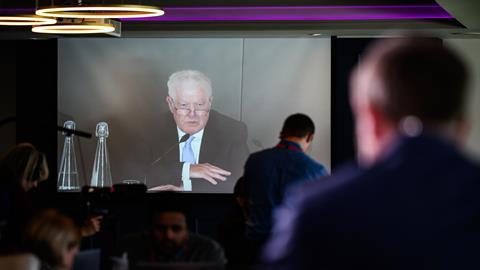The first report of the Post Office inquiry highlights the personal experiences of those affected by the Horizon scandal, while condemning the lack of legal advice for compensation claims
This week’s first report of the Post Office Horizon IT Inquiry focused on two issues: human impact and compensation.
Chair Sir Wyn Williams made it clear he wanted to ensure that the personal stories of so many affected by the Horizon IT scandal were not obscured. There will be time for acrimony and blame, but this was about making sure people were heard. Confirmation that 13 former postmasters may have taken their own lives because of the misery inflicted upon them brought home how devastating this episode has been. Many more continue to live with the heartache of family breakdown, bankruptcy, homelessness and unemployability. Horizon’s tentacles stretched further than we had ever imagined.
Williams further stressed that ongoing issues with granting full and fair compensation must be resolved urgently. It is a grim reality that ever-increasing numbers of victims are dying without receiving what they are owed. The chair remains baffled as to why there needed to be four compensation schemes (now down to three) and why the Post Office was not prepared (from the moment that Mr Justice Fraser blew apart the scandal through his two judgments, and certainly from the Court of Appeal quashing 39 convictions) to start discussing settlements immediately.
'The Post Office and its advisers have adopted an unnecessarily adversarial attitude towards making initial offers. This has had the effect of depressing the level at which settlements have been achieved'
Sir Wyn Williams, Post Office Horizon IT Inquiry chair
The Williams report is clear that too many negotiations became bogged down in legal arguments and nit-picking over quantum. It is hardly surprising that postmasters accused of theft 20 years ago and turfed out of branches before they could collect their belongings might struggle to provide evidence of losses.
Williams said: ‘I am persuaded that in the difficult and substantial claims, on too many occasions, the Post Office and its advisers have adopted an unnecessarily adversarial attitude towards making initial offers. This has had the effect of depressing the level at which settlements have been achieved.’
The most common route to compensation is the Horizon Shortfall Scheme (HSS), which has received around 10,000 claims. This number may well rise if, as Williams recommended, the scheme is widened to allow relatives to make claims of their own.
In his report, Williams highlighted the case of Millie Castleton, who was eight when her father Lee was taken to court by the Post Office to recover £25,000 apparently missing from his branch. He was bankrupted by the Post Office’s £321,000 costs bill and his daughter suffered years of bullying and assaults at school, also developing an eating disorder.
Williams said some of the terms of the HSS were ‘indefensible’. Claimants are offered a fixed £75,000 take-it-or-leave-it settlement but receive no support for legal advice. It is only if they reject the fixed offer that the government steps in to pay for ‘reasonable’ costs of legal help.
This ‘fear factor’ forces claimants to choose between settling or taking the gamble of carrying on – all without an expert advising how much their claim might be worth. Williams’ report cites evidence that those who reject the first sum are then offered substantially more the second time around once they have a lawyer. The difference between first and second offers has topped £100,000 on occasion.
‘I regard it as unconscionable and wholly unfair that claimants in the HSS are unable to obtain legal advice, paid for by the department, about whether they should opt for the fixed sum offer or assessment of their claims,’ said Williams. ‘Yet the department continues to resist this as if its life depended on it.’
He recommended that the government cover legal costs from the start. It has until 10 October to respond.
Herbert Smith Freehills, the firm which advised Post Office on the HSS, was name-checked in the report. Williams said he was persuaded by evidence to the inquiry that HSF took a ‘conventional legalistic approach’ when it should have been more flexible. One civil servant reported that HSF was ‘prone to argue, unnecessarily, about comparatively small sums of money’.
In a statement, HSF said: ‘Since our firm was first engaged in this matter, our teams supporting the Post Office have worked with the professionalism and diligence that our clients expect. We remain committed to supporting the Post Office, alongside the independent advisory panel, in their assessment and delivery of compensation that is fair and accessible.’
Williams suggested at the outset of his report that he believed some within Post Office had covered up what they knew about the flaws in Horizon. He pulled no punches, and for those who represented the organisation during this scandal it promises to be an uncomfortable wait for the next volumes.
This article is now closed for comment.





































4 Readers' comments